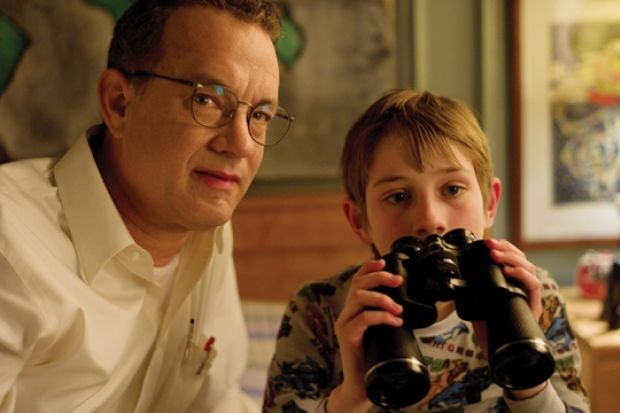Extremely Loud and Incredibly Close
Directed by Stephen Daldry
Starring Tom Hanks, Sandra Bullock, John Goodman, Thomas Horn and Max von Sydow
Released in the UK on 17 February
It happened at 8.46am Eastern Standard Time on a bright Tuesday morning, when an aircraft flew out of the blue sky, going too fast, too low, and everything suddenly went horribly wrong; and we are still feeling its aftershocks more than a decade later. Oskar Schell, the obsessive, possibly autistic young protagonist of this movie - whose beloved father Thomas (Tom Hanks) died in the World Trade Center on 11 September 2001 - could tell you exactly how long ago the towers fell, to the nearest second.
Since that Tuesday morning, the US has been working through its grief and rage in a variety of ways; through retaliation, through sentiment and, symbolically, through cinema, television and literature. William Gibson’s Pattern Recognition, published in early 2003, was one of the first novels to reflect on the events - the book’s heroine lost her father in the attacks - and Audrey Niffenegger’s The Time Traveler’s Wife, from the same year, incorporated the traumatic cultural shift of 11 September into its own story of loss and longing. More recently, Christopher Nolan’s film The Dark Knight (2008) shows Batman compromising civil liberties in order to combat the Joker’s terrorist threat.
Oskar, packing his utility rucksack with binoculars, a gas mask, a camera and mobile phone, and vowing to “not stop looking…not ever”, may look for a moment like a miniature Bruce Wayne: determined, driven and utterly focused, he responds to grief by constructing a “reconnaissance” mission that he believes will solve his father’s last secret. But then he adds Fig Newton biscuits to his rucksack, and picks up his tambourine, and immediately we’re in quirkier territory.
Extremely Loud and Incredibly Close, like Jonathan Safran Foer’s original novel, offers a lighter, soapier variant of Paul Auster’s more austere and challenging New York fictions. It toys showily with signs, words, sound and meaning - Oskar’s quest is prompted by an envelope marked with the name “Black”, and his encounters include an old man called The Renter (Max von Sydow) who communicates through “yes” and “no” tattoos on the palms of his hands - but is too easily satisfied by its own cute whimsy, rather than attempting a deeper interrogation of the city and its language.
Although we are invited to see the world through Oskar’s eyes - and frequently told that he is an unusual boy who follows strange, self-harming routines, finds solace in rituals and discovers odd patterns in the city’s chaos - the film’s visual vocabulary is disappointingly stale. When a vase falls from a shelf and shatters, director Stephen Daldry immediately switches to slow motion. When Oskar races across a bridge, the camera instantly cranes back to a majestic wide angle. Flashbacks are signalled through a shift into soft focus, and Oskar’s fragmented impressions of the city overflow into a rapid montage. The final shot, intended as an epiphany, recalls the very similar freeze-frame at the end of Daldry’s Billy Elliot. Even the casting of Hanks as the World’s Best Dad feels like the easiest and most obvious creative choice.
Oskar’s desperate attempts to impose order on a sense of loss that defies logic are undeniably moving. But when the script includes scenes where a young boy tearfully listens to his father’s last voicemails, Extremely Loud and Incredibly Close does not have to work hard for its emotional effect, and Oskar’s aggressively precocious attitude sometimes irritates rather than charms. Whether you warm to him may depend on whether you think a nine-year-old marching into a stranger’s house and demanding “iced coffee with half and half” deserves to be shown the door, rather than met with amused indulgence.
Perhaps the most haunting scene is one in which, unusually, Oskar does not appear at all. For a few brief minutes, we are alone in a flashback with his mother Linda (Sandra Bullock), on the phone to her husband as she realises, horribly, that he is on a high floor of the smoking towers, and begs him quietly not to hang up the phone. Then we’re back to Oskar, howling as he races down the streets of New York, like a young nation working out its grief and acting out its rage. You can’t help feeling for him. But as an attempt to explore the complex legacy of 9/11, this film doesn’t try incredibly hard, and doesn’t really come close.
Register to continue
Why register?
- Registration is free and only takes a moment
- Once registered, you can read 3 articles a month
- Sign up for our newsletter
Subscribe
Or subscribe for unlimited access to:
- Unlimited access to news, views, insights & reviews
- Digital editions
- Digital access to THE’s university and college rankings analysis
Already registered or a current subscriber? Login
